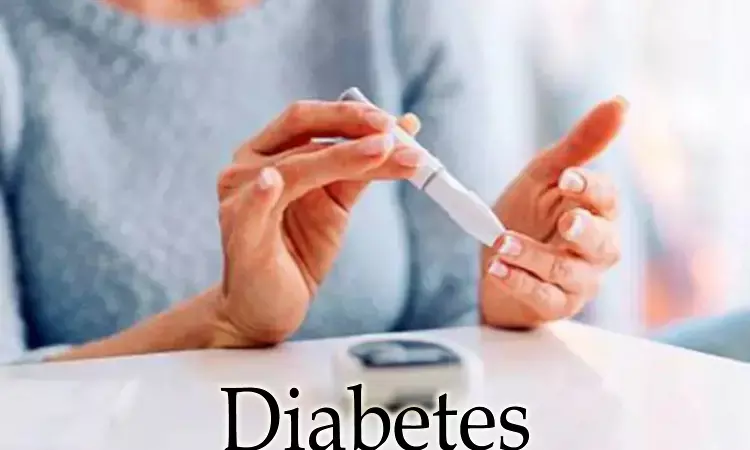- Home
- Medical news & Guidelines
- Anesthesiology
- Cardiology and CTVS
- Critical Care
- Dentistry
- Dermatology
- Diabetes and Endocrinology
- ENT
- Gastroenterology
- Medicine
- Nephrology
- Neurology
- Obstretics-Gynaecology
- Oncology
- Ophthalmology
- Orthopaedics
- Pediatrics-Neonatology
- Psychiatry
- Pulmonology
- Radiology
- Surgery
- Urology
- Laboratory Medicine
- Diet
- Nursing
- Paramedical
- Physiotherapy
- Health news
- Fact Check
- Bone Health Fact Check
- Brain Health Fact Check
- Cancer Related Fact Check
- Child Care Fact Check
- Dental and oral health fact check
- Diabetes and metabolic health fact check
- Diet and Nutrition Fact Check
- Eye and ENT Care Fact Check
- Fitness fact check
- Gut health fact check
- Heart health fact check
- Kidney health fact check
- Medical education fact check
- Men's health fact check
- Respiratory fact check
- Skin and hair care fact check
- Vaccine and Immunization fact check
- Women's health fact check
- AYUSH
- State News
- Andaman and Nicobar Islands
- Andhra Pradesh
- Arunachal Pradesh
- Assam
- Bihar
- Chandigarh
- Chattisgarh
- Dadra and Nagar Haveli
- Daman and Diu
- Delhi
- Goa
- Gujarat
- Haryana
- Himachal Pradesh
- Jammu & Kashmir
- Jharkhand
- Karnataka
- Kerala
- Ladakh
- Lakshadweep
- Madhya Pradesh
- Maharashtra
- Manipur
- Meghalaya
- Mizoram
- Nagaland
- Odisha
- Puducherry
- Punjab
- Rajasthan
- Sikkim
- Tamil Nadu
- Telangana
- Tripura
- Uttar Pradesh
- Uttrakhand
- West Bengal
- Medical Education
- Industry
Age for diabetes screening should be reduced to 35: USPSTF draft recommenation

USA: The U.S. Preventive Services Task Force (USPSTF) has released a draft recommendation which proposes to lower prediabetes and type 2 diabetes' screening age of adults with obesity or overweight from 40 to 35 years.
According to the recommendations, these patients should continue to be screened for type 2 diabetes and prediabetes until they reach the age of 70 years.
The draft recommendation aimed to systematically review the evidence on benefits and harms of (1) screening for abnormal blood glucose and type 2 diabetes and (2) interventions for prediabetes or type 2 diabetes that was screen detected or recently diagnosed for populations and settings relevant to primary care in the United States.
The lower baseline age for screening, which carries a B grade, is a "major change" from the 2015 final USPSTF recommendation in this clinical area, said Chien-Wen Tseng, a task force member and research director in the department of family medicine and community health at the University of Hawaii John A. Burns School of Medicine. She added that changes in epidemiological data prompted the revised recommendation.
The USPSTF, citing CDC data, said 34.5% of all U.S. adults meet criteria for prediabetes and 13% of all U.S. adults have diabetes. Among the latter group, 21.4% did not know they had the disease or did not report having it. In addition, only 15.3% of adults with prediabetes said a health professional notified them of their status.
The authors of a related evidence review wrote that criteria for prediabetes includes impaired fasting glucose, impaired glucose tolerance and a glycated hemoglobin ranging from 5.7% to 6.4%, while type 2 diabetes is characterized as having insulin resistance and relative insulin deficiency.
"Trials of screening for diabetes found no mortality benefit at 10 years but had insufficient data to assess other health outcomes. Evidence on harms of screening was scant. For people with screendetected diabetes, one trial found no improvement in health outcomes over 5 to 10 years. For people with recently diagnosed (not screen-detected) diabetes, interventions improved health outcomes over 10 to 20 years," wrote the authors.
"For obese or overweight people with prediabetes, interventions were associated with reduced incidence of diabetes and improvement in other intermediate outcomes, and limited evidence suggests that very high-contact lifestyle interventions improve health outcomes after more than 20 years."
Reference:
Screening for Prediabetes and Type 2 Diabetes Mellitus
Dr Kamal Kant Kohli-MBBS, DTCD- a chest specialist with more than 30 years of practice and a flair for writing clinical articles, Dr Kamal Kant Kohli joined Medical Dialogues as a Chief Editor of Medical News. Besides writing articles, as an editor, he proofreads and verifies all the medical content published on Medical Dialogues including those coming from journals, studies,medical conferences,guidelines etc. Email: drkohli@medicaldialogues.in. Contact no. 011-43720751


